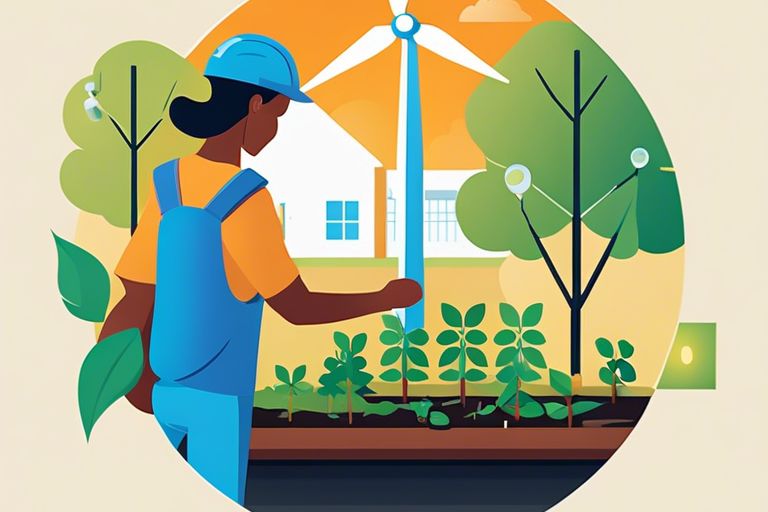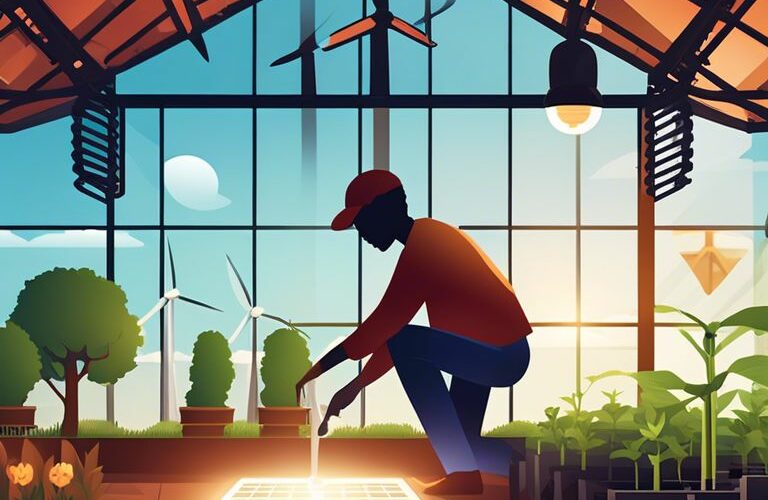Embarking on a journey towards sustainable living can seem daunting, but with the right knowledge and resources, it can be an achievable and rewarding goal. As our planet faces the dangerous effects of climate change and environmental degradation, it is more crucial than ever to make conscious efforts to reduce our carbon footprint and save energy. By implementing small changes in our daily habits, we can make a significant impact on the health of our planet. In this style blog post, I will be sharing 10 eco-friendly tips that will not only help you minimize your environmental impact, but also save you money in the long run. Whether you’re a seasoned environmentalist or just starting out on your sustainability journey, these practical tips will equip you with the knowledge to make a positive change.
Table of Contents
Key Takeaways:
- Conservation is key: Conserving energy is the foundation of reducing your carbon footprint. Simple changes like turning off lights when not in use and using energy-efficient appliances can make a big impact.
- Reduce, reuse, recycle: The mantra of reducing, reusing, and recycling applies to all aspects of life, including energy consumption. Using reusable products, reducing waste, and recycling whenever possible can significantly decrease your carbon footprint.
- Invest in renewable energy: Transitioning to renewable energy sources, such as solar or wind power, can help further reduce your reliance on fossil fuels and minimize your environmental impact.
Reduce Energy Consumption
To reduce our carbon footprint and save energy, it is important to focus on reducing our energy consumption in our daily lives. By making small changes, we can have a big impact on the environment and our energy bills.
Use LED bulbs
Energy-efficient lighting is a simple way to reduce energy consumption in our homes. LED bulbs use up to 80% less energy than traditional incandescent bulbs and can last up to 25 times longer. By switching to LED bulbs, we can save energy and money while also reducing our carbon footprint.
Additionally, LED bulbs do not contain harmful chemicals like mercury, which is often found in traditional light bulbs, making them safer for the environment and our health.
Unplug unused devices
With the increasing number of electronics in our homes, it is important to be mindful of which devices are plugged in and consuming energy when not in use. Unplugging unused devices can save energy and reduce our electricity bills. Many electronic devices continue to consume energy even when turned off or in standby mode, so unplugging them when not in use can make a significant difference.
Reduce your energy consumption by creating a habit of unplugging devices such as chargers, televisions, and kitchen appliances when they are not in use. This simple action can have a positive impact on both the environment and your wallet.
Lower Heating and Cooling
Any home can be more energy-efficient when it comes to heating and cooling. By implementing some simple changes, you can reduce your carbon footprint and save energy.
Set thermostats wisely
One of the easiest ways to save energy is by setting your thermostats wisely. During colder months, lower your thermostat when you’re not at home or when you’re sleeping. During warmer months, raise your thermostat to a comfortable but not overly cool temperature. By making these adjustments, you can significantly reduce the energy used to heat or cool your home.
Insulate your home
Insulate your home to keep the temperature more consistent and reduce the need for constant heating or cooling. Proper insulation prevents heat from escaping in the winter and entering in the summer, lowering your energy consumption and improving the comfort of your home.
With better insulation, you can also save money on your energy bills and contribute to a healthier environment by reducing your carbon footprint.
Embrace Renewable Energy
Unlike non-renewable energy sources like coal and natural gas, renewable energy sources such as solar, wind, and hydroelectric power are clean, sustainable, and do not produce harmful emissions. Embracing renewable energy is one of the most effective ways to reduce your carbon footprint and contribute to a cleaner, healthier planet.
Install solar panels
Install harnessing the power of the sun, solar panels are a highly efficient way to generate electricity for your home. By installing solar panels on your rooftop, you can significantly reduce your reliance on traditional energy sources and lower your electricity bills in the long run. Plus, many governments and utility companies offer incentives and rebates to offset the initial cost of installation.
Choose green providers
When panels come to choosing an energy provider, opt for those that offer green energy options. Many providers now offer renewable energy plans that source electricity from renewable sources such as wind or solar. By choosing a green provider, you can support the growth of renewable energy and help drive down the demand for fossil fuels.
With the increasing availability of renewable energy options and the declining cost of installation, embracing renewable energy is more accessible and affordable than ever before. Whether it’s installing solar panels on your rooftop or choosing a green energy provider, making the switch to renewable energy is a critical step towards mitigating the impact of climate change and preserving the planet for future generations.

Limit Water Use
Now, let’s talk about the importance of limiting water use to reduce your carbon footprint and save energy. Conserving water is crucial for the environment and essential in the effort to combat climate change. Here are some practical tips to help you limit water use in your daily life.
Fix leaks promptly
Any leaks in your home, whether it’s a dripping faucet or a running toilet, can waste a significant amount of water over time. It’s essential to fix any leaks promptly to prevent unnecessary water wastage and reduce your water bill. Regularly check for leaks in your plumbing, and if you find any, take immediate action to repair them. This simple step can make a big difference in conserving water and reducing your carbon footprint.
Take shorter showers
To further limit water use, consider taking shorter showers. This not only reduces water consumption but also helps you save energy by using less hot water. Consider using a timer or playing your favorite song to keep track of your shower time and aim to reduce it gradually. By taking shorter showers, you can contribute to conserving water and protecting the environment while also cutting down on your utility costs.
Shorter showers can significantly reduce water usage and save energy, contributing to a more sustainable lifestyle. By incorporating this simple habit into your daily routine, you can make a positive impact on the environment and help reduce your carbon footprint.
Conscious Transportation Choices
After making the switch to eco-friendly habits at home, it’s time to consider our transportation choices. The way we travel can have a significant impact on our carbon footprint. By making conscious decisions about how we get from place to place, we can reduce our environmental impact and save energy.
Bike or walk more
Any journey that is two miles or less could easily be made by walking or cycling. Not only are these modes of transportation great for the environment, but they also have the added benefit of keeping you active and improving your health. By choosing to bike or walk more often, you can significantly reduce emissions, cut down on traffic congestion, and contribute to a cleaner, healthier community.
Use public transit
Transit systems like buses, trains, and trams offer a cost-effective and environmentally friendly alternative to driving. By utilizing public transit, you can reduce your carbon footprint, cut down on air pollution, and decrease traffic congestion. Additionally, it allows you to relax during your commute instead of dealing with the stress of driving, contributing to a more sustainable and enjoyable way of getting around.
It also has the added benefit of saving money on gas and parking, and can be a more efficient way to travel in busy urban areas. By taking advantage of public transit, you can contribute to a more sustainable and energy-efficient future for our planet.
Minimize Air Travel
Not only is air travel a major contributor to carbon emissions, it also consumes a significant amount of energy. By minimizing air travel, you can help reduce your carbon footprint and save energy.
Vacation locally
With the beauty of local destinations, there’s no need to fly across the country or overseas for a vacation. By choosing to vacation locally, you can reduce your carbon footprint by avoiding air travel and supporting your local economy at the same time. Take the opportunity to explore the natural wonders and cultural attractions in your own region, and you’ll be making a positive impact on the environment while enjoying a fulfilling vacation.
Teleconference when possible
Not only can air travel for business meetings or conferences be time-consuming and tiring, it also takes a toll on the environment. Vacation conferencing when possible instead of traveling can significantly reduce your carbon footprint and save energy. With the advancements in technology, it’s easier than ever to hold virtual meetings and conferences without the need for air travel.
A combination of maximizing the use of teleconferencing and minimizing air travel can lead to a substantial reduction in carbon emissions and energy consumption, contributing to a more sustainable future for our planet. Taking these small steps can make a big difference in the long run, and help protect the environment for future generations.
Sustainable Eating Habits
Unlike other aspects of our lives, our eating habits have a significant impact on the environment. By making sustainable choices in our diet, we can reduce our carbon footprint and contribute to a healthier planet. Here are some tips for adopting sustainable eating habits that can make a difference.
Eat more plants
For a more sustainable diet, consider incorporating more plant-based foods into your meals. Plant-based diets require fewer natural resources and generate lower greenhouse gas emissions compared to diets high in animal products. Choosing fruits, vegetables, legumes, and whole grains not only benefits the environment but also contributes to better health. By reducing the demand for animal products, you are helping to reduce the negative impact of livestock farming on the environment.
Reduce food waste
The average person wastes a significant amount of food each year, contributing to environmental degradation. By reducing food waste, you can reduce the amount of resources and energy used in the production and distribution of food. Plan your meals, store food properly, and repurpose leftovers to minimize waste. By being mindful of your food consumption, you can have a positive impact on the environment.
Waste reduction can help in conserving water resources and reducing methane emissions from decomposing food in landfills. By minimizing food waste, you are contributing to a more sustainable and efficient food system.
Support Eco-Friendly Products
For those looking to reduce their carbon footprint and support environmental sustainability, choosing to support eco-friendly products is a crucial step. By opting for products that are designed with sustainability in mind, you can make a positive impact on the planet and encourage businesses to prioritize eco-friendly practices.
Buy biodegradable items
With the increasing concern over plastic pollution, opting for biodegradable items is a great way to minimize environmental impact. Biodegradable products can break down naturally, reducing the amount of waste that ends up in landfills or oceans. Look for biodegradable packaging, utensils, and even personal care products to make a more sustainable choice for the planet.
Choose recycled materials
To further support eco-friendly products, consider choosing items made from recycled materials. Recycled materials help to reduce the demand for new resources and minimize the energy required for production. Look for products made from recycled paper, plastic, glass, and textiles to lessen the environmental impact of your purchases.
Plus, supporting the use of recycled materials helps to close the recycling loop, creating a more circular economy where materials are reused rather than discarded after a single use.
Engage in Nature Conservation
Despite the growing concern about the impact of human activities on the environment, many people are still unaware of the importance of nature conservation. Engaging in nature conservation is crucial for reducing carbon footprint and saving energy. By actively participating in conservation efforts, we can help protect the environment and ensure a sustainable future for generations to come.
Plant trees
Conservation of trees is fundamental in reducing carbon footprint and mitigating the effects of climate change. Trees play a vital role in absorbing carbon dioxide and releasing oxygen into the atmosphere. By planting trees, we can contribute to carbon sequestration and combat the alarming rate of deforestation. Whether in your backyard or community, every tree planted makes a significant impact on the environment.
Conservation of trees not only benefits the environment but also provides habitats for various wildlife species. Trees are essential for maintaining biodiversity and supporting ecosystems. Additionally, they help in preventing soil erosion and provide shade, reducing the need for excessive energy consumption for cooling.
Protect wildlife habitats
With the ongoing urbanization and human encroachment, many wildlife habitats are at risk. Protecting wildlife habitats is crucial for preserving biodiversity and ensuring the balance of ecosystems. By preserving natural habitats, we can protect endangered species and maintain the delicate balance of nature. Avoiding disturbance in these areas is important for the survival of many wildlife species.
Protecting wildlife habitats also contributes to ecotourism, providing economic benefits to local communities and encouraging the conservation of natural environments. By supporting sustainable tourism practices, we can help protect wildlife habitats and promote the importance of preserving these areas for future generations.
Conclusion
Drawing together the various eco-friendly tips mentioned, it is evident that small changes in daily habits and lifestyle choices can significantly reduce an individual’s carbon footprint and help save energy. By implementing practices such as using energy-efficient appliances, reducing water usage, and opting for sustainable transportation, individuals can make a positive impact on the environment. Additionally, making the switch to renewable energy sources and supporting eco-friendly products can also contribute to a more sustainable future for our planet.
It is important for individuals to understand the role they can play in reducing their carbon footprint and saving energy. By adopting these eco-friendly tips, we can collectively work towards mitigating the effects of climate change and preserving our planet for future generations. It is essential to continue educating ourselves and others on the importance of sustainability and taking proactive steps to make a difference in our environment.
FAQ
Q: What are some easy eco-friendly tips to reduce my carbon footprint and save energy?
A: One easy tip is to switch to energy-efficient light bulbs. Another tip is to unplug electronics when they’re not in use to reduce energy consumption.
Q: How can reducing my carbon footprint benefit the environment?
A: Reducing your carbon footprint can help decrease air and water pollution, conserve natural resources, and mitigate climate change impacts, ultimately benefiting the environment and future generations.
Q: What is the importance of using reusable products and recyclables?
A: Using reusable products and recyclables reduces the amount of waste that goes to landfills and conserves natural resources by preventing the need for new materials to be produced. It can also lower carbon emissions associated with manufacturing new products.
Q: Why is it important to lower energy consumption at home?
A: Lowering energy consumption at home reduces demand on energy resources, reduces greenhouse gas emissions, and helps to lower electricity bills, ultimately saving money in the long run.
Q: How can reducing my carbon footprint and saving energy contribute to a more sustainable future?
A: By reducing your carbon footprint and saving energy, you are contributing to the overall health of the planet and ensuring a more sustainable future for generations to come. It helps in preserving natural resources, reducing pollution, and lessening the impacts of climate change.

Our contributing author is a passionate advocate for eco-friendly living and sustainability. With a background in eco-life, they are dedicated to inspiring and empowering individuals to adopt environmentally conscious lifestyles. Through insightful articles, they share practical tips, innovative solutions, and thought-provoking perspectives to promote a greener, more sustainable world. Join them on the journey towards eco-smart living and discover how small choices can make a big impact. 🌱








